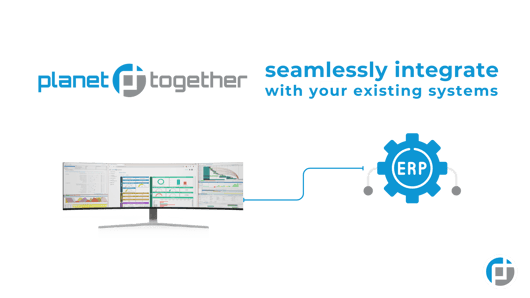
Elevating Material Requirement Planning in Pharmaceutical Manufacturing with Advanced Scheduling Integration
In pharmaceutical manufacturing, the difference between smooth production and costly disruptions often hinges on effective Material Requirement Planning (MRP). With the industry's stringent regulatory environment, precise batch processing, and volatile demand, traditional planning approaches struggle to deliver the necessary visibility and agility. For production schedulers, the challenge lies not only in forecasting demand accurately but in aligning it with real-time material availability, capacity, and compliance requirements.
This is where advanced planning and scheduling (APS) tools like PlanetTogether, integrated with enterprise systems such as SAP, Oracle, Microsoft Dynamics, Kinaxis, or Aveva, offer a game-changing solution. These integrations allow schedulers to optimize production flows, minimize material shortages, and ensure batch traceability—while adapting rapidly to demand changes and supply disruptions.
This blog explores how production schedulers in pharmaceutical manufacturing can leverage MRP powered by APS-ERP integration to streamline operations, reduce lead times, and remain compliant in a highly regulated environment.

The Complexity of MRP in Pharma Manufacturing
Material Requirement Planning, at its core, involves determining what materials are needed, in what quantity, and when they should be available for production. While MRP may sound straightforward, pharmaceutical manufacturing introduces several unique complexities:
Batch Production and Lot Control: Every batch must comply with strict validation and traceability standards.
Short Shelf Lives: Raw materials and finished products often have expiration constraints that influence scheduling priorities.
Regulatory Oversight: Compliance with cGMP, FDA, EMA, and other international standards requires granular documentation and auditability.
Variable Demand: Demand is frequently driven by clinical demand fluctuations, seasonal diseases, and global health emergencies.
Schedulers are often tasked with synchronizing these variables while avoiding both shortages and overstocking, which can be wasteful or even dangerous.
Why Traditional MRP Falls Short
Most legacy MRP systems work using static rules or dated forecast data. They often lack:
Real-time updates on supply chain changes
Visibility into actual machine or line capacities
Scenario analysis tools to model production alternatives
Integration with quality control data and regulatory checkpoints
Without the capability to adapt dynamically, these systems force schedulers into reactive planning—resulting in unplanned downtimes, material obsolescence, or missed batch release deadlines.

The APS Advantage: Introducing PlanetTogether
PlanetTogether Advanced Planning and Scheduling (APS) software addresses the limitations of traditional MRP by enabling real-time, constraint-based, and predictive planning. When integrated with major ERP systems such as SAP, Oracle, Microsoft Dynamics, Kinaxis, or Aveva, PlanetTogether turns static data into actionable intelligence.
Key features of this integrated system include:
Dynamic Material Synchronization: Automatically aligns material availability with actual production schedules.
Finite Capacity Scheduling: Takes into account machine availability, labor, and clean-in-place (CIP) or sterilization downtime.
What-If Scenario Modeling: Allows schedulers to simulate different production scenarios in response to material delays or demand spikes.
Automated Alerts: Proactively notifies users of potential material shortages or expired inventory.
By combining these capabilities, production schedulers can shift from reactive firefighting to proactive orchestration.

How Integration Works: From Data to Decisions
When PlanetTogether is integrated with an ERP system like SAP, here’s how the workflow typically unfolds:
ERP Inputs: Material masters, inventory levels, purchase orders, and production orders are imported into PlanetTogether.
Constraint-Based Scheduling: PlanetTogether considers all constraints—material availability, machine capacity, labor shifts, and cleaning times—before generating a realistic, optimized schedule.
Visual Planning Boards: Schedulers can view a Gantt chart or drag-and-drop interface to adjust sequences and explore alternatives in real-time.
Feedback Loop: Once an optimal schedule is created, updates are pushed back into the ERP, ensuring consistency across departments.
This seamless data flow reduces miscommunication, accelerates decision-making, and ensures compliance across all touchpoints.
Benefits for Production Schedulers
Enhanced Accuracy
Integrated MRP through PlanetTogether ensures up-to-date material statuses, improving the accuracy of scheduling decisions.
Improved Batch Coordination
With visibility into batch constraints, hold times, and inspection periods, schedulers can plan with confidence—minimizing rework or recall risk.
Compliance Built-In
Lot tracking, audit trails, and CFR 21 Part 11 support mean compliance is not an afterthought but a core feature.
Faster Response to Change
Whether a supplier misses a delivery window or demand shifts suddenly, PlanetTogether enables agile rescheduling across facilities.
Cost Reduction
Reduced inventory holding costs, minimized scrap, and efficient use of equipment translate to significant savings.
In pharmaceutical manufacturing, production schedulers are the linchpins holding together material flow, regulatory compliance, and product delivery. Material Requirement Planning, once seen as a rigid backend function, is now a strategic enabler of manufacturing agility and responsiveness.
With advanced APS systems like PlanetTogether, integrated with enterprise platforms such as SAP, Oracle, Microsoft, Kinaxis, or Aveva, schedulers gain real-time visibility, predictive capabilities, and operational control that traditional systems simply cannot match.
For production schedulers looking to navigate the pressures of modern pharmaceutical manufacturing—from short product lifecycles to strict regulations—integrated MRP is no longer a luxury; it’s essential.
Are you ready to take your manufacturing operations to the next level? Contact us today to learn more about how PlanetTogether can help you achieve your goals and drive success in your industry.